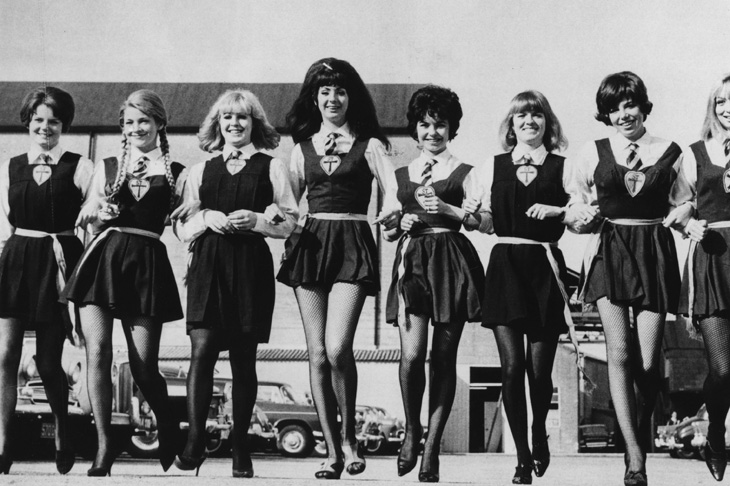Yes
Alex Renton
Last week some 20,000 children under the age of 14 packed their bags to return to boarding school for the summer term: a migration unique in anthropology. The habit was born of necessity for the rural gentry in the 18th century, and it became customary for the wealthy and aspirational in the 19th century. But what possible need for boarding is there in the 21st?
Some parents say they have no choice. ‘She literally made me do it,’ one mother told me of her eight-year-old, residing at a very smart prep in the Midlands. ‘I was in bits. Still am. But she’d read Harry Potter and Malory Towers and her mind was made up.’ I pointed out that neither J.K. Rowling nor Enid Blyton had gone to boarding school, and wondered gently what might happen when her daughter discovered that her wizard’s wand didn’t function and that boarding wasn’t a ten-week sleepover party at Alton Towers. Her mother laughed: ‘Not an issue. She just adores it. Friends galore. We just about had to drag her home at half-term.’
I am glad for both of them, but not convinced. Children tend to tell parents what they want to hear — they like to protect us from the nasty realities. A child informed that he or she should adore boarding school, or that Mummy and Daddy scrimped and saved for their great adventure, is a child with a burden. To admit life at school isn’t glorious is to fail, to be unworthy. I never told my parents how miserable I was at my prep school, at eight or at 13. I was ashamed; I thought they might be hurt — and besides, the cane-happy headmaster had told us not to sneak. Caning was banned 20 years ago, but the pressures on children to say the required thing are still strong, at home and at school.
I’ve interviewed dozens of parents and boarding school teachers to find out how this eminently Victorian practice persists — thrives — today. There are broadly three strands of defence, which cross over. First are the must-dos. Jobs, geography or family breakdown make boarding the best solution. You have to have sympathy with the last; clearly for some children a stable, secure home with reliable adults to trust, if not love, may be better than what’s at home. The flip side is that the schools get used as a ‘dump’, as a housemaster at an eminent public school puts it. ‘You wouldn’t believe how rubbish some parents are. Most exeat weekends, come Friday evening, I’ll have a couple of kids waiting miserably in the hall with their bags. Then the phone call — we’re desperately busy, could you just hold on to him till Sunday? Some people should not have kids at all.’
The next argument is less voiced. But it’s clearly as significant as it was during the great private schools boom in the late 19th century. Some wealthy parents buy boarding as they might a Bentley — it is a status-marking commodity. A proven good investment, too: the class that uses these schools still dominates Britain’s elite, as it did in the 1860s and the 1960s. Prep boarding is the easiest route into public schools and so into the Establishment. If you have £350,000 to spare, why not spend it buying your child a slot on the top shelf?
The most honest and interesting argument for boarding is even more ancient. ‘Wisdom comes through suffering,’ my old headmaster Billy Williamson liked to say, quoting Aeschylus (though Billy was talking about the school food). From Sir Thomas Browne to Friedrich Nietzsche, the thought has echoed.
The Book of Proverbs backs it up: ‘He that spareth his rod hateth his son: but he that loveth him chasteneth him betimes.’ If, as has been said, the British have been uniquely brutal to their children, it was with reason. By the end of the 19th century, much of the world believed that the ritual brutalities and humiliations dealt out at the great British boarding schools were necessary to produce a very special Briton. How else would a handful of young men run Baluchistan or Zululand?
Ah, today’s parents say, that was then and this is now. It isn’t about producing empire builders but responsible citizens. There are mobile phones and flexi-boarding. Duvets, teddy bears and child-protection policies. But I’ve been told of several schools where they advise no contact from the parents for the first weeks after the parting. That is not so very different from the 1930s headmaster who, when asked by a mother why she couldn’t visit her boy every weekend, responded: ‘Madam, if you had a puppy would you cut off its tail an inch at a time, or all at once?’
I don’t think that pre-teen boarding schools set out to break a child like a young horse any more, nor that they tolerate predatory adults as mine and many others did in the 1970s and 1980s. But you won’t find a single child psychologist or development expert who thinks the practice is anything but a grave risk. The schools and what they do are an anachronism: it’s time to say goodbye to the notion, along with other things we used to think were a good idea — sending small boys up chimneys, marrying off girls at 12. Children are better off at home.
Alex Renton is the author of Stiff Upper Lip: Secrets, Crimes and the Schooling of a Ruling Class.
No
Lara Prendergast
Like Alex Renton, I went to a prep school in Sussex where I boarded for a few years. Unlike him, I have happy memories of my time there. I doubt my experience would make for a gripping book. For me — and for most of the friends I have stayed in touch with — boarding wasn’t horrific but great fun. But who wants to read about the good times? Brutality makes for better copy.
There is no denying boarding school used to be tough. Older generations were sent away at a very young age, and would barely see their parents all term. Corporal punishment was the norm. Sadists and perverts flocked to these schools, knowing full well that nobody would ask many questions.
Literature does a good job of reinforcing the sense that boarding schools are ruthless places that churn out dysfunctional characters. Alex’s book is no exception. He has extrapolated from his own experiences, and found contemporary sources who confirm them. Boarding school is terrible for children, they say, supported by quotes from authors such as Dickens, Kipling and Evelyn Waugh. Alex paints a hellish picture. It’s just not one that I recognise.
For society has changed, and so have boarding schools. The cane has been packed away for years now. Children are both seen and heard. Educational expectations have risen. Communication has changed beyond recognition. My grandfather’s generation would receive a handful of letters a term, if that. By the time I was boarding in the early noughties, I could speak to my parents every day if I wanted — but why would I? There were hundreds of things to be getting on with.
Because that is what boarding school meant to us: friends — and freedom. Weekends and holidays were for the family, but during term time we formed close-knit groups, and those bonds have endured. Returning home was something we cherished. I looked forward to seeing my parents at the weekends, whereas friends of mine who went to day school found it frustrating to be stuck with their family night after night.
Our school taught discipline, but what kind doesn’t? Most of the time we played by the rules, but everyone misbehaved at times, just to see where the limits lay. If you were caught in another person’s dormitory after lights out, you could face a week of changing the bed sheets in the boarding house. Pupils learned to be inventive when it came to breaking the rules. It was almost as important a life lesson as learning to follow them. We dreamt up imaginative ways to smuggle in contraband — and parents were involved. One girl had a clever wheeze which resulted in a local takeaway joint delivering boxes of cold, greasy pizza to the school squash courts.
Did we feel unloved because we weren’t constantly at our parents’ side? Of course not. Most of us had begged them to let us go and when we went home we would regale them with stories of our adventures. They seemed grateful that we were testing the school’s authority, rather than theirs.
What about the perverts and the sadists? No boarding school anecdote is complete without a few grisly characters, so we loved dreaming up stories about angry history teachers and drunken matrons. One boy set up an underground magazine filled with such stories — mostly imaginary — that was passed around surreptitiously. Others learnt the Childline phone number by heart, and whispered it in corridors when those in loco parentis walked past, just to wind them up. But if there had genuinely been a problem, we would have called our parents. Most, if not all, of the teachers seemed kind and wanted us to do well. They cared about what happened to us and hoped we were happy, as did our parents. I think for the most part, we were.
When I eventually arrived at university, I found it strange to discover that some of my fellow undergraduates felt homesick.They had never lived away before. I could remember that feeling, but I was glad to have got that part of the process out of the way. Everyone has to grow up at some stage — and doing it in the safe confines of a boarding school didn’t seem all that bad. There are worse things than a stiff upper lip.
I don’t want to sound callous or dismiss those who say they hated it. Boarding school can be an unhappy place for some — although find me a school that isn’t at times. But is it cruel and are children always better off at home? I don’t think so. I suspect that for everyone who says they had a terrible time, there are many more who adored it.
Lara Prendergast is online editor of The Spectator.
Got something to add? Join the discussion and comment below.
Get 10 issues for just $10
Subscribe to The Spectator Australia today for the next 10 magazine issues, plus full online access, for just $10.
You might disagree with half of it, but you’ll enjoy reading all of it. Try your first month for free, then just $2 a week for the remainder of your first year.














Comments
Don't miss out
Join the conversation with other Spectator Australia readers. Subscribe to leave a comment.
SUBSCRIBEAlready a subscriber? Log in